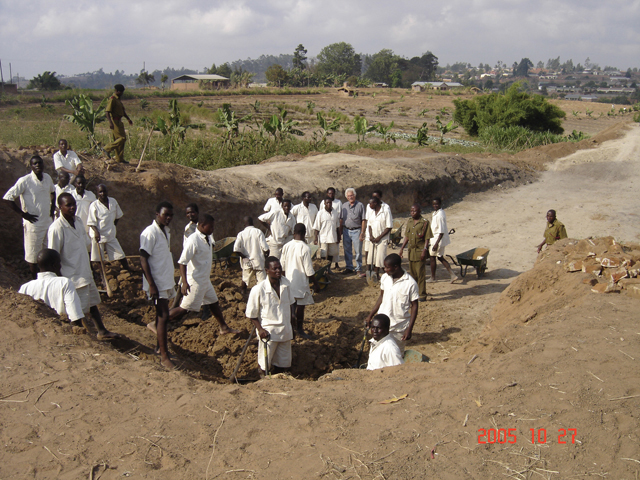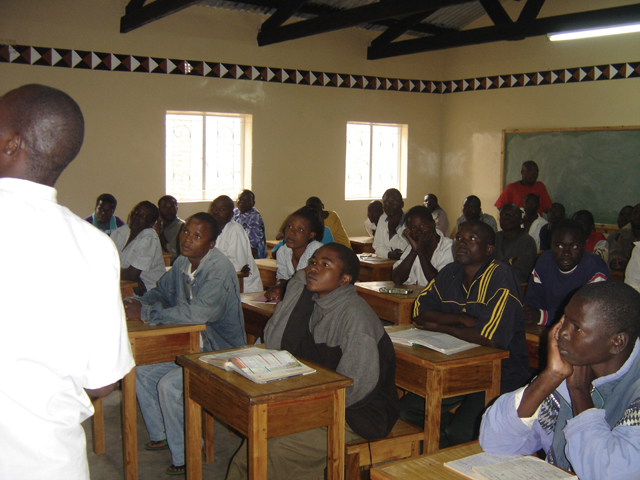A window of hope
The new rehabilitation facility of Mzuzu prison offers juvenile prisioners a chance for new life through education and counselling
By Ray Vantomme
September/October 2007
Return to Table of Contents
Print Article
In 2000, a local committee was formed to provide school and rehabilitation services in the Mzuzu Prison in Malawi, Africa. Fr. Peter Huten of the Society of Missionaries of Africa was the main initiator. This project has developed slowly but securely with junior and high school exams now being held inside the prison. Several students have achieved high marks and some have qualified for university.
The headmaster, Mr. Simwaka, a qualified teacher and a prisoner, has worked hard to develop this school. When the project began, classes were held outdoors, rain or shine, led by adult prisoners who are qualified teachers. A small library was set up in an office, with books obtained with the help of the Canadian government’s International Development Agency (CIDA), the Mzuzu District Education Office, the local women’s prison support group and others.
St. John of God Community Services, a member of the original project committee, began offering group counseling for young people in the prison in 2003. Devlin Silungwe and Scarboro missioner Beverley Vantomme began this service with more than 30 juveniles attending weekly.
In the rainy season, counseling occurred in various places within the prison, such as in the guard’s change room where the telephones are located. A secretary was often typing while sessions were being held. Confidentiality was non-existent. The juveniles squeezed into the room, sitting on top of and under a large table and on sacks of maize, and they spilled out the door. When not raining, counseling occurred outside in the hot sun by the small noisy carpentry area, the young prisoners crowded in a corner for a bit of shade.
In 2004 St. John of God College of Health Sciences began offering individual counselling to prisoners provided by students taking the one-year counseling program at the College. This was very successful even though there were no private spaces inside the prison. Counseling services were offered outside in a storage room or behind a wall, with interruptions, noise and very little privacy.
It was clear that despite the successes of the prison school and rehabilitation project, the environment was not conducive to learning or for counseling. As the placement coordinator for the College’s student counselors, Beverley Vantomme recognized a need for something more. With the help of the St. John Of God Community Services and CIDA, Beverley initiated the construction of a rehabilitation building for juveniles attached to the prison compound.
The rehabilitation area would provide the following:
- Schooling to prisoners who wish to learn, and ensure that those in F2 (grade 10) and F4 (grade 12) are able to write exams each year.
- Professional emotional and psychological counseling (individual and group), to prisoners, working through unresolved issues of their childhood and their present life experiences.
- Life skills training in such areas as anger and stress management, self-esteem and assertiveness.
- Computer skills training.
- Awareness and education on HIV/AIDS and alcohol and drug abuse.
- A therapeutic environment for psychiatric assessment and treatment for prisoners with a mental illness.
- A space for pastoral counseling (spiritual counseling) and for Church services.
The Mzuzu Prison rehabilitation building would allow the St. John of God Community Services and other organizations to offer transformative rehabilitation programs to prisoners in a conducive and therapeutic environment in an effort to prevent reoffending and recidivism. While the programs would focus on and give priority to juvenile prisoners, female and adult prisoners would not be excluded.
 Credit: Ray Vantomme
Credit: Ray VantommeScarboro missioner and project technical advisor Ray Vantomme and the Mzuzu prison construction crew digging the foundation at the first stage of the prison’s rehabilitation building.
Many of the juveniles at Mzuzu prison are serving severe sentences for petty crimes. One young man is serving four years for selling an old mattress to feed his three young siblings and himself; another is serving a seven-year sentence for stealing shoes that he needed for school (in Malawi, a student can be expelled for not wearing black shoes).
The prison was originally built for 150 prisoners and at times there are 600. The women are separated from the men. The juvenile boys are to be separated from the adult male prisoners, however the dividing fence had collapsed resulting in daily abuse for these young boys. During construction, we began the work of replacing this fence. Life is raw here and any or all survival mechanisms surface.
We encountered many logistical problems during construction and the project took twice as long as it normally would. Work was stopped during prison lock-ups, sometimes lasting for days due to escapes. Prison lock-ups also occurred when the rains were heavy during the rainy season. As well, the prison vehicle was often not available to pick up building supplies because it was needed to gather firewood for cooking or it was broken down and there were no funds for repairs.
All construction was done by prisoners who have a trade or are learning a trade as part of their rehabilitation. Because the crew wore the white prison clothes and I, a white person (mzungu), was their technical advisor, they were known as the “White White Construction Company”. (The prison has since established its first football team that the players have named the “White White Construction Football Team”.)
Two very hard-working and committed guards, Mr. Msowoya and the late Mr. Chawinga, were very much a part of the construction crew. When the building was completed, Beverley ensured that special touches were added such as the painting of doves on the walls of the counseling rooms, cushions on the chairs, curtains where permitted, and the planting of grass, flowers and shrubs around the building.
The building includes two large classrooms, two individual counseling rooms, a library and a computer room. Three computers were donated by Dawson College in Montreal. St. John of God Community Services provided training for two male guards and one female guard to teach computer skills. Classroom furniture and curtains were made by St. John of God Vocational Training psychiatric clients and the counseling room furniture was made by the Mzuzu diocesan carpentry workshop, an income-generating project of Mzuzu diocese.
The prison administration was most welcoming and supportive of St. John of God Community Services and in particular to this project. Special mention must be made to Mr. Kainja, Regional Prison Officer (North Malawi); Madame Chrissy Namakupula, Mzuzu Prison’s Officer in Charge; Mr. Botha, Second Officer in Command; and Mr. Mkandawire, the guard in charge of the school.
Many prison guards also supported the idea of rehabilitation in the Mzuzu prison. Some with little education are taking part in the school classes and the computer training.
As Scarboro missioners, this project was a tremendous experience of being among the outcasts of society. The prison became another mission community in which Beverley and I learned much about life within and outside its walls. We felt privileged to accompany these young people, as well as the adult prisoners we came to know, and we tried to be present to their suffering. We listened to many sad stories about their frightening and despairing lives in this prison world. We will never be the same people as we were before.
Jesus calls us to reach out to those who have been stripped of their dignity and humanity, and to help them in their efforts to regain hope, wholeness and new life. Now prisoners who wish to take advantage of the programs at the small rehabilitation building at the Mzuzu Prison can do so in a therapeutic, dry and warm facility.
Scarboro lay missioners Ray and Beverley Vantomme first went to Malawi in January 1996. This summer they completed their service with Scarboro Missions and have returned to their home province of Alberta “to refresh, renew and continue in mission wherever God calls us.”
Return to Table of Contents
Print Article
